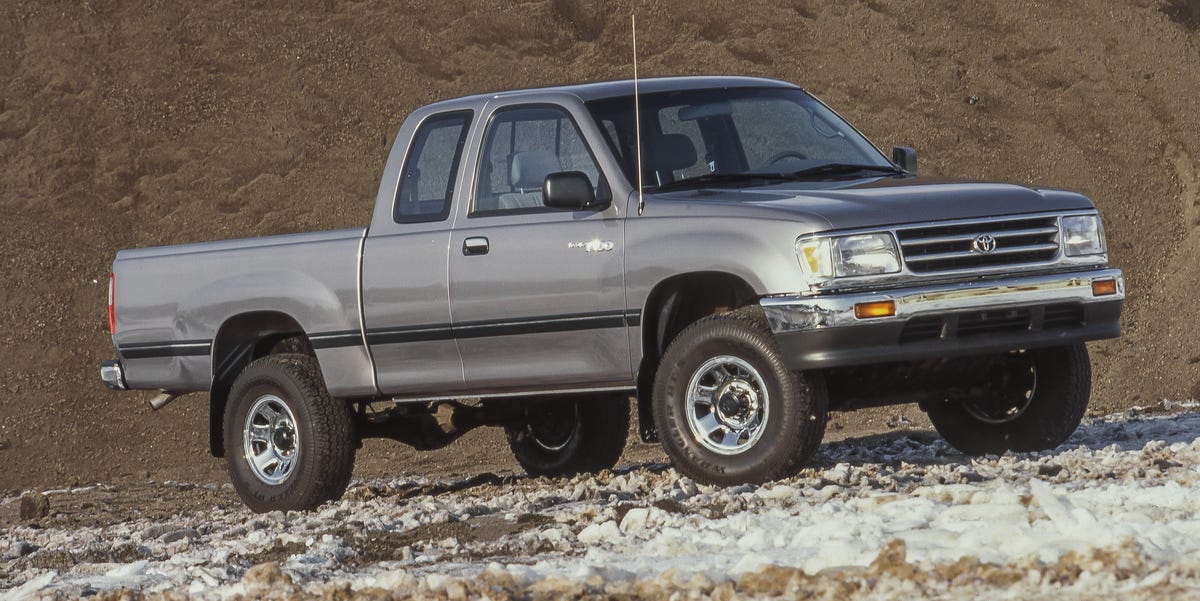
From the July 1995 issue of Car and Driver.
No one accused the Toyota T100 of being just another pretty pickup when it was introduced in late 1992. As Japan’s first bigger-than-little truck to make it to the U.S., some wondered if Toyota purposely made it undistinguished-looking to avoid antagonizing Ford, GM, and Chrysler, who saw the full-sized pickup market as their last unchallenged turf.
After all, the T100 was already overpriced, thanks to the 25-percent American tax on imported trucks. A well-equipped, manual-transmission 1993 T100 SR5 four-wheel-drive listed for over $22,000, which was about $3500 more than a full-sized, V-8-powered Ford F-150 4×4 with an automatic transmission. So, understandably, thousands of T100s gathered dust in dealer showrooms, forcing Toyota to ante up embarrassingly large incentives to move the truck out the door.
There were four fundamental problems with the T100. It needed more power, it needed an extended-cab version, it was not good-looking, and it was overpriced. Toyota said it would fix the T100, and now it has, mostly.
As for power: The 3.0-liter V-6, venerable old soldier that it was, has finally been retired. It has been replaced by a 3.4-liter V-6, with 24 valves and double overhead camshafts. Horsepower is 190, an increase of 40 over the old 3.0-liter. Torque is up 40 pound-feet, to 220.
As for an extended cab: The interior of the T100 Xtracab adds 21.4 cubic feet of space, with the total interior room comparable to that of the extended-cab Ford F150.
As for the looks: With the addition of the second side window and the shorter bed (it’s 76.1 inches long, which is 21.5 inches shorter than the regular-cab bed), the T100 Xtracab is almost pretty, particularly the four-wheel-drive version.
And as for the price: Well, three out of four isn’t bad.
Our test T100 4×4 was the midrange DX model, and although it is reasonably well appointed—air conditioning, carpet, cruise control, sliding rear window—no one would mistake it for a luxury package. The dashboard is unpadded hard plastic, the headliner is Tercel-quality felt, and the AM/FM/cassette sound system is mediocre. You have to wind up the windows, and outside mirror have no inside adjustment. Only the rear brakes have anti-lock control. The transmission is a five-speed manual.
Price: $22,634. Not outrageous, but about $2000 more than a comparably equipped full-sized Ford or Chevy. Of course, no truck maker has a better reputation for durability than Toyota, and that’s worth something.
Indeed, this T100 offers much more than the original. The rear seat is livable for short periods, thanks in part to a 15-degree recline in the backrest (unlike many rear truck seats that are completely vertical). There’s loads of room on the front bench for the driver and right-seat passenger.
Handling is surprisingly sporty, and the ride, even on rough roads, is quite good. Take the T100 off the pavement—the four-wheel drive is shift-on-the-fly—and it feels considerably more nimble than, say, a Chevrolet K1500 extended-cab. Though the rear suspension is low-tech leaf-spring, the wheels stay planted even on rugged terrain. The 31 x 10.5-R 16 Goodyear Wrangler radials—a $615 option, which includes chromed steel wheels—are an excellent compromise for on- and offroad driving.
What makes the T100 more than acceptable is this 3.4-liter V-6, which is the most sophisticated truck engine on the market. It’s as smooth as the 3.0-liter engine in the Avalon, but it’s gutsy enough to tow 5000 pounds. Peak torque comes at 3600 rpm, meaning you can usually accelerate to pass without downshifting. Toyota may still run into some resistance from Bubbas who insist on V-8 power, but this engine should satisfy the vast majority of truck customers.
The 150-horsepower 2.7-liter four cylinder is the standard engine on the two-wheel-drive T100, but it should be considered only by fleet customers. This V-6 is simply too good to pass up. (Of course, if you really want to go fast, this 3.4-liter V-6 is optional in the compact Toyota Tacoma Xtracab, which weighs 600 pounds less.)
Aside from the comparatively spartan appointments and front seats that lack lumbar support, our T100 Xtracab DX gave us little to complain about. A passenger-side airbag would be nice, as would four-wheel anti-lock brakes, which are a $950 option.
Toyota has made good on its pledge to fix the T100. It’s up to customers to give it another chance.
This content is created and maintained by a third party, and imported onto this page to help users provide their email addresses. You may be able to find more information about this and similar content at piano.io
